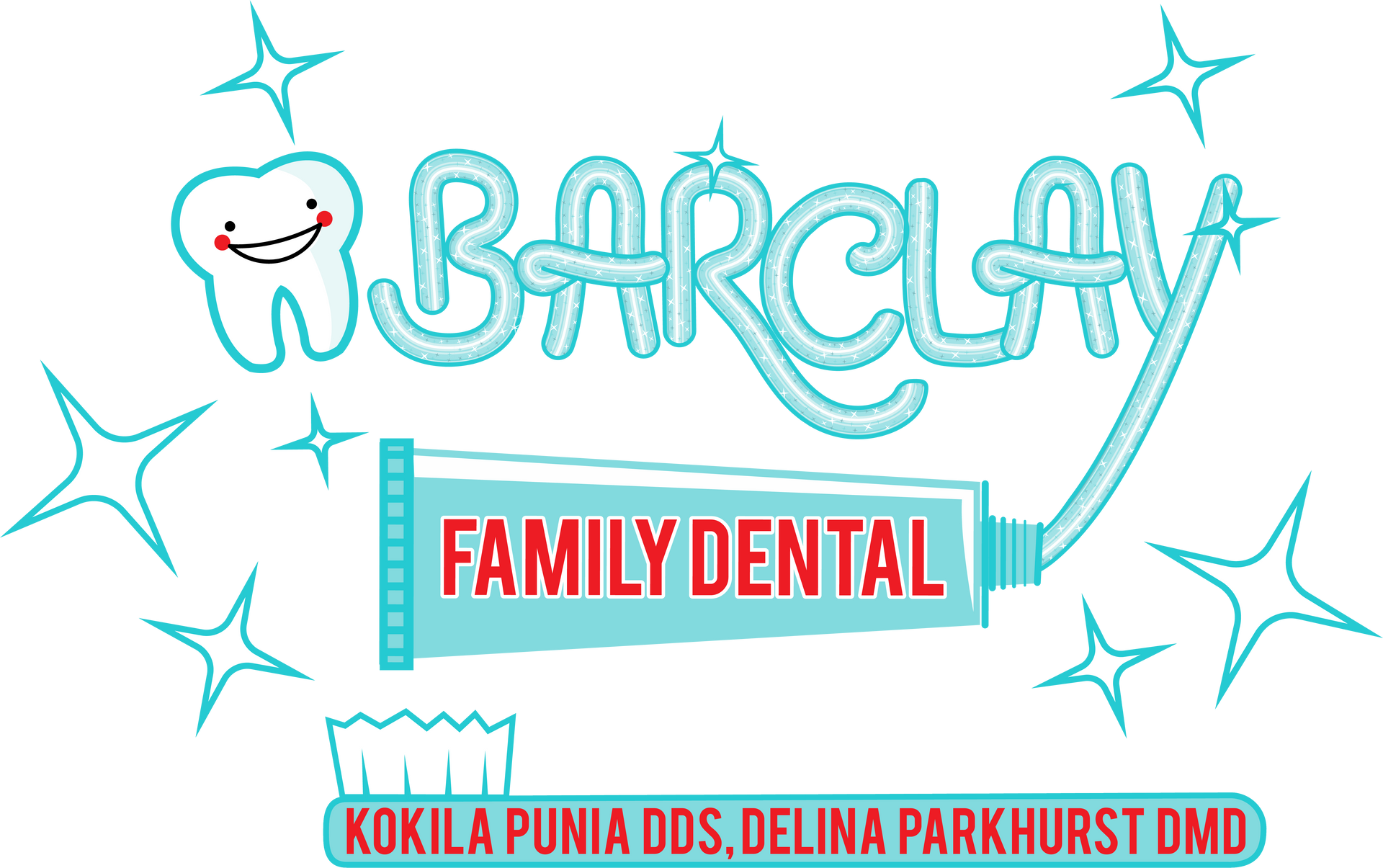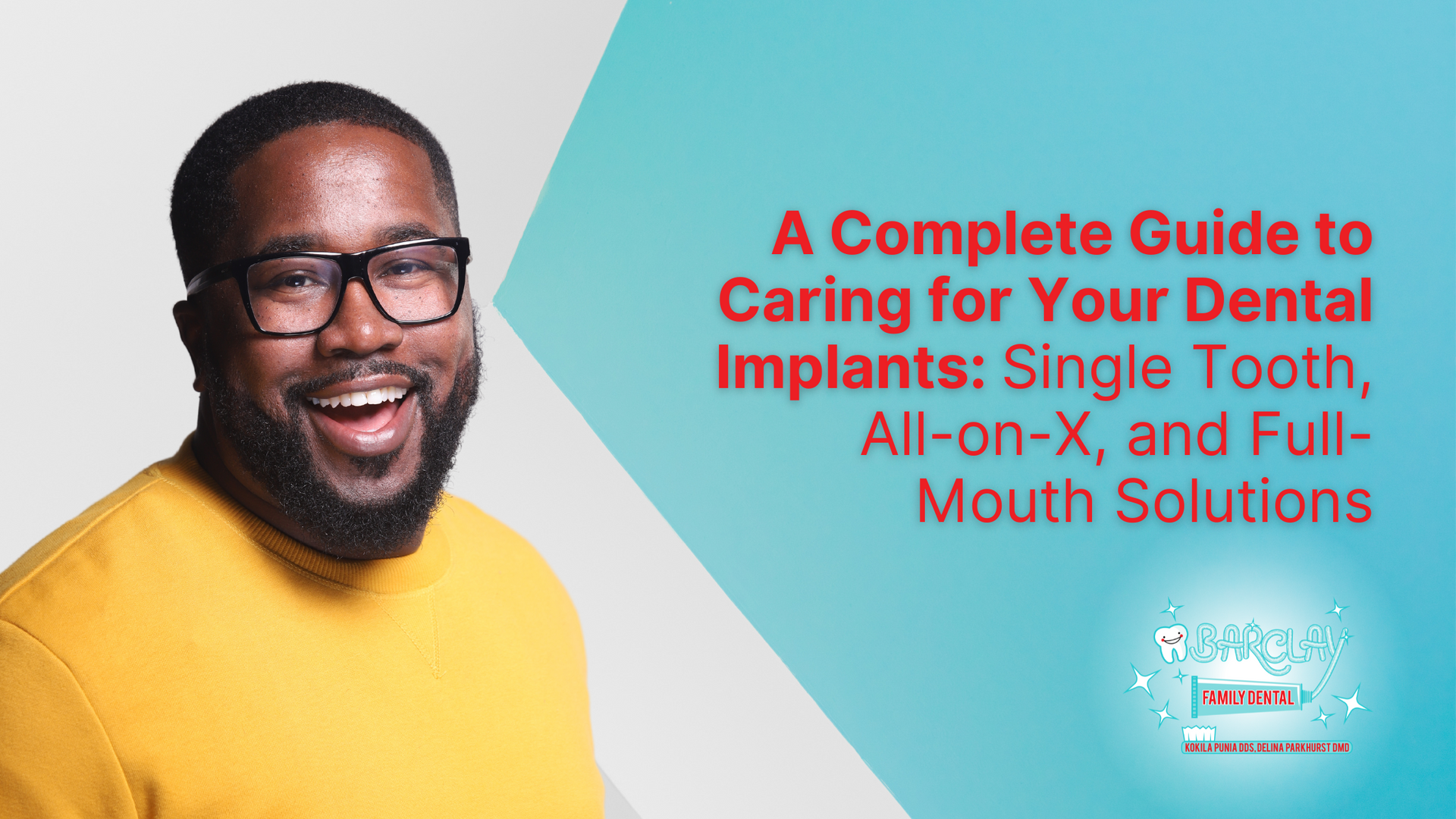Which Dental Implant Is Best for You? Exploring Traditional, Mini, and All-on-4 Implants
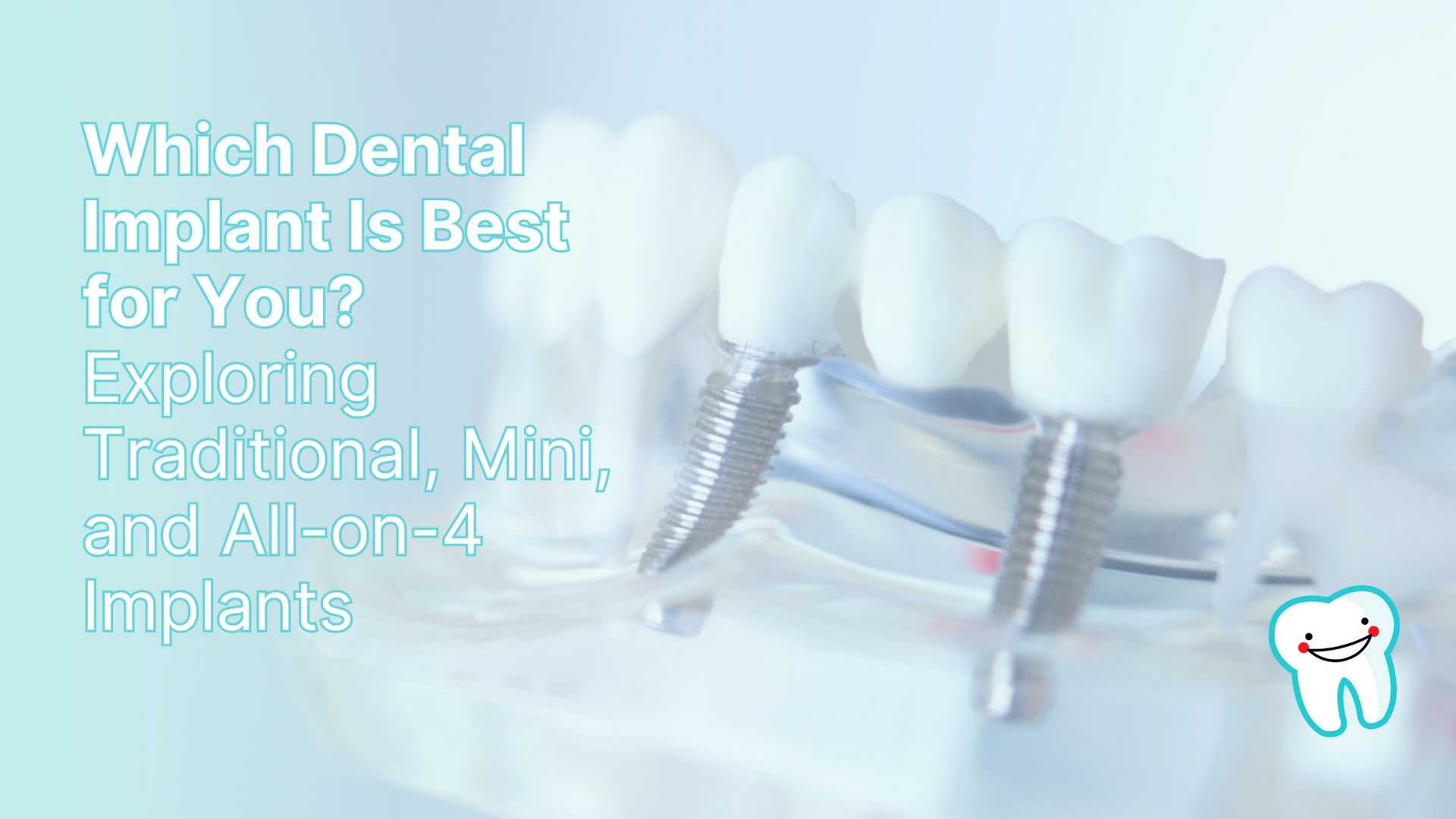
Source: Dr. Marketing
Dental implants are a popular and effective solution for replacing missing teeth, providing a long-lasting and natural-looking alternative to dentures or bridges. However, not all dental implants are the same, and choosing the right type for your needs requires careful consideration. At Barclay Family Dental, our dentists are committed to helping you make an informed decision about which implant option is best suited to your unique situation.
In this post, we will explore the three primary types of dental implants: traditional implants, mini implants, and All-on-4 implants. We will break down the differences between these options and provide guidance on how to choose the best one for your oral health needs.
What Are Dental Implants?
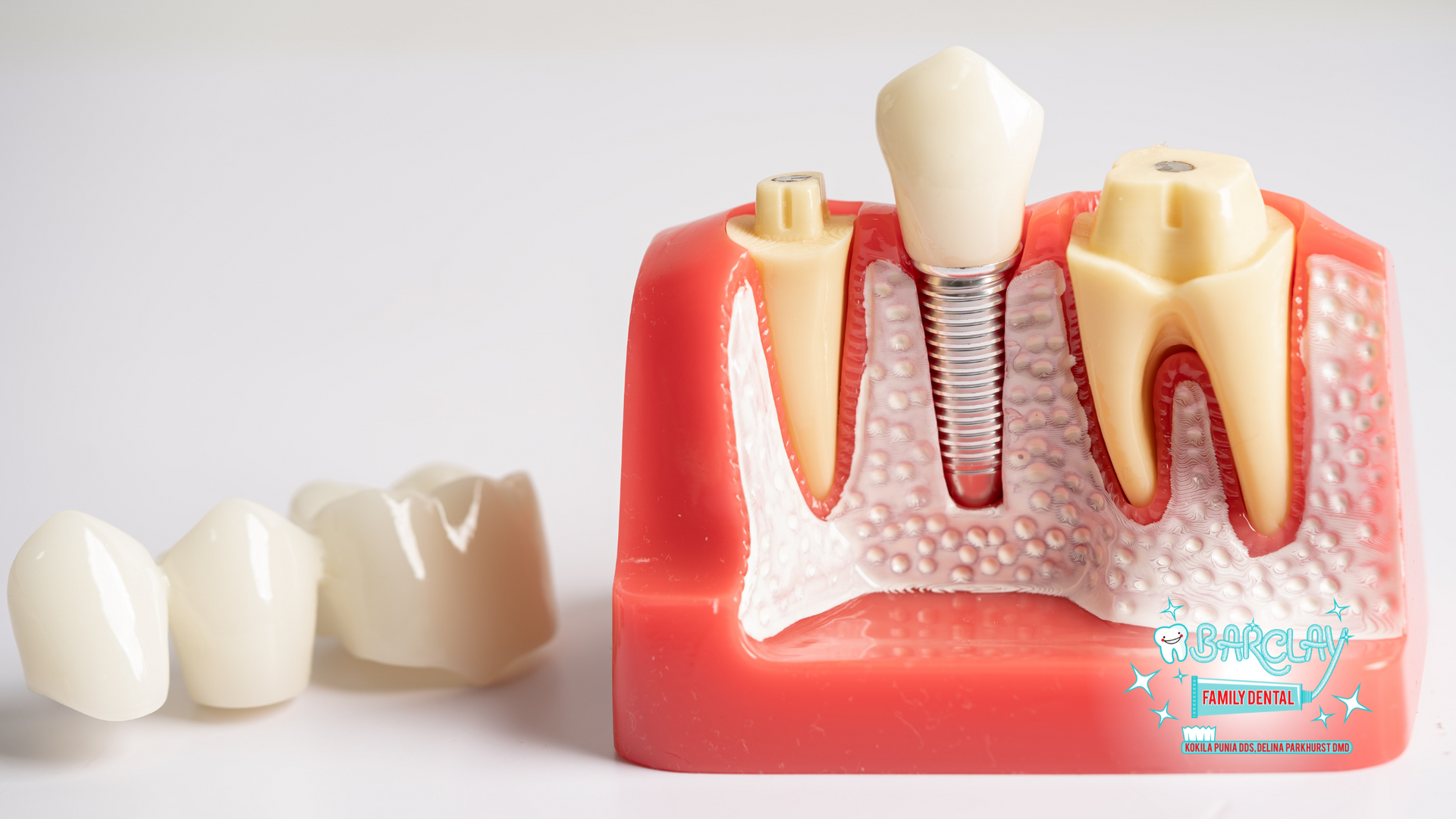
Dental implants are artificial tooth roots made from biocompatible materials, such as titanium. These implants are surgically placed into the jawbone, where they fuse with the bone to create a strong and stable foundation for replacement teeth, such as crowns, bridges, or dentures. Implants are known for their durability and ability to mimic the appearance and function of natural teeth.
Now that we understand what dental implants are, let's dive into the three main types.
Traditional Dental Implants

Traditional dental implants are the most common and widely used type of dental implant. They are designed to replace one or more missing teeth and can support a single crown, a bridge, or even full dentures. A traditional implant involves two key components: the implant post, which is surgically inserted into the jawbone, and the restoration (the artificial tooth) that is attached to the post once healing is complete.
Key Features of Traditional Implants
Size and Strength
Traditional implants are larger and more robust than other options, making them ideal for replacing molars or other teeth that require extra stability.
Bone Requirements
Since these implants are larger, they require a sufficient amount of healthy jawbone for proper support. If bone loss has occurred due to missing teeth or gum disease, a bone graft may be necessary before the implant can be placed.
Treatment Duration
The placement process for traditional implants typically involves two stages. After the implant is placed into the jawbone, a healing period of several months is required to allow the implant to integrate with the bone. Once healed, the final restoration is attached.
Who Are Traditional Implants Best For?
Traditional dental implants are ideal for patients who have enough bone density in their jaw and are looking for a durable, long-term solution to replace one or more teeth. They are particularly well-suited for those who do not mind a slightly longer treatment timeline.
Mini Dental Implants

Mini dental implants are a smaller version of traditional implants and are often used when patients have less bone density or smaller jaw structures. Unlike traditional implants, which are placed in two stages, mini implants can often be placed in a single visit, making them a faster option for tooth replacement.
Key Features of Mini Implants
Size and Placement
As the name suggests, mini implants are smaller in diameter compared to traditional implants. This makes them ideal for patients with less jawbone density or those who are not candidates for bone grafting.
One-Step Procedure
In many cases, mini implants can be placed and fitted with a temporary crown or denture on the same day. This makes them an attractive option for patients seeking immediate results.
Less Invasive
The smaller size of mini implants means they require less invasive surgery, which can lead to a quicker recovery and less discomfort compared to traditional implants.
Who Are Mini Implants Best For?
Mini implants are a great choice for patients who have lost bone density but want to avoid bone graft surgery. They are also a good option for patients who want a faster, more immediate tooth replacement solution. However, they may not be as strong as traditional implants and are typically used for smaller teeth or for supporting dentures.
All-On-4 Implants
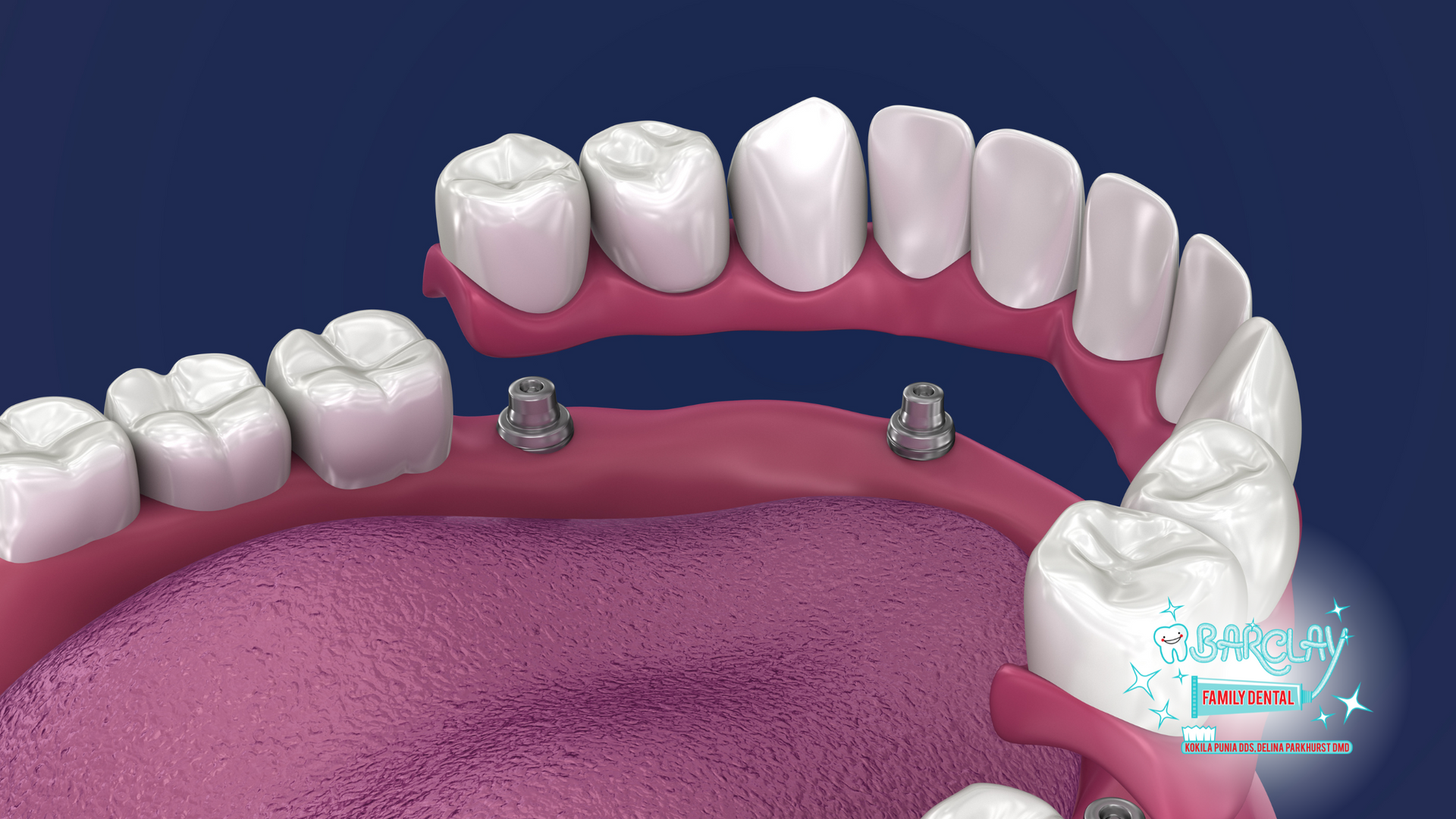
All-on-4 implants are a revolutionary solution for patients who need to replace an entire arch of teeth. Instead of placing an individual implant for each missing tooth, the All-on-4 method uses just four strategically placed implants to support a full denture or bridge. This approach provides a stable and permanent alternative to traditional removable dentures.
Key Features of All-on-4 Implants
Full Arch Restoration
With only four implants, this system supports a full set of upper or lower teeth, making it an efficient solution for patients who have lost most or all of their teeth.
Immediate Results
In many cases, the All-on-4 method allows for immediate placement of a temporary denture or bridge on the same day as the implants. Patients can leave the dental office with a fully functional smile.
Avoids Bone Grafting
The placement of the four implants is designed to maximize contact with the existing bone, often eliminating the need for bone grafting, even in patients with significant bone loss.
Who Are All-on-4 Implants Best For?
All-on-4 implants are an excellent option for patients who are missing most or all of their teeth and want a permanent, stable alternative to traditional dentures. They are especially suited for patients who want to avoid the lengthy process of bone grafting and individual implant placement.
How to Choose the Right Type of Implant for You

Choosing the right type of dental implant depends on several factors, including your oral health, the number of missing teeth, and your overall treatment goals. Here are a few key considerations to help guide your decision:
Bone Health
If you have significant bone loss, mini implants or the All-on-4 system may be better suited for your needs, as they often do not require bone grafting. Traditional implants, on the other hand, may need additional procedures to ensure there is enough bone support.
Number of Teeth to Replace
If you are missing one or two teeth, traditional implants may be the ideal choice. For those missing many or all teeth, the All-on-4 system offers a comprehensive solution. Mini implants are often used when fewer teeth need replacement or when supporting a smaller restoration.
Treatment Timeline
If you are looking for a faster option with immediate results, mini implants or All-on-4 implants are more likely to meet your expectations. Traditional implants, while offering the strongest support, typically require more time for placement and healing.
Budget
Dental implants are an investment in your long-term oral health, and the cost of treatment can vary depending on the type of implant chosen. Traditional implants may involve a higher upfront cost due to the need for multiple appointments or additional procedures, while mini implants and All-on-4 solutions can offer more cost-effective alternatives.

At Barclay Family Dental, our team of experienced dentists will work closely with you to assess your oral health, discuss your options, and develop a personalized treatment plan. We are dedicated to providing you with the best dental implant solution to restore your smile and improve your quality of life.
Are you ready to take the first step in exploring your dental implant options? Our team at Barclay Family Dental is here to guide you through the process and answer any questions you might have. Don't hesitate to get in touch with us today by calling (856) 288-3708. Alternatively, you can easily request an appointment online at your convenience.
Let us help you choose the best implant solution to bring back your smile and confidence!








